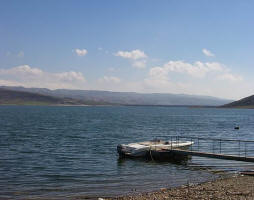 Water Recycling and Reuse by Application of Membrane Bioreactors: Textile and Municipal Wastewater as Examples
Water Recycling and Reuse by Application of Membrane Bioreactors: Textile and Municipal Wastewater as Examples
- Limited water resources and increasing environmental pollution are main
problems in most Third Countries. A new membrane bioreactor (MBR) system
will be developed for recycling and reuse of wastewater. Textile and
municipal wastewater as the main sources of wastewater in North Africa will
be used for bench- and pilot-scale tests.
-Extremely low concentrated and germ free effluents can be achieved with
MBR systems, producing only small amounts of excess sludge. The increased
biodegradation requires a low cut-off (e.g. ultra filtration), which is not
used in known MBR-systems.
-Nevertheless, the specific costs for wastewater reuse in Third Countries
have to be reduced.
-New membrane materials, innovative module concepts and the combination
with anaerobic bioreactors (less energy and CO2-production) will be used for
reaching the proposed goals.
| Project number | ICA3-CT-1999-00013 | ||
|---|---|---|---|
| Subject(s) | |||
| Acronym | MBR-Recycling | ||
| Geographical coverage | Austria, Algeria, Germany | ||
| Budget (in €) | 540000 | ||
| Programme | INCO MED (FP5) | ||
| Objectives | - A three year research project is proposed for the development and
application of improved biological systems for recycling and reuse of
textile and municipal wastewater. - Aerobic and anaerobic membrane bioreactor (MBR) systems will be further developed with the following objectives: • Improved biological degradation for the removal of recalcitrant compounds and complete germ reduction, absolutely necessary for water recycling and reuse • Reduction of investment costs by improving the specific flux rates • Reduction of operation costs by using anaerobic systems (methane production), by developing low energy membrane modules and by reducing the excess sludge production • Reduction of the specific treatment costs to 1 – 2 EUR/m3 • Demonstration of the feasibility of MBR systems for water recycling and reuse with pilot tests in the textile industry and in a municipal wastewater plant |
||
| Results | Development of an economic and payable technology for water treatment and
recycling • Business management analysis Removal of hazardous and recalcitrant compounds as well as germs and viruses from the food chain • Determination via germ and virus detection as well as quality control with biotests Investigation of the feasibility, the performance, the safety of operation and the operational costs for MBR-systems • Determination during on-site pilot tests with textile and municipal wastewater Minimizing the operational of costs of MBR-Systems by reducing the pressure drop and using submerged membrane systems • Reduction in specific energy consumption Decreasing the investment costs by comparison of different membrane materials • Higher specific flow rates Energy balance of anaerobic MBR-Systems • Methane gas production in relation to energy consumption of membrane filtration Reduction in excess sludge production • Carbon balances, microscopic sludge determination and comparison with conventional systems Improved biodegradation due to the selected separation of macromolecules • Comparison with the existing conventional wastewater treatment systems Reuse of the treated water • Test for selected applications e.g. in the textile production |
||
| Period | [01/03/2000 - 28/02/2003] | ||
 you are not logged in
you are not logged in





